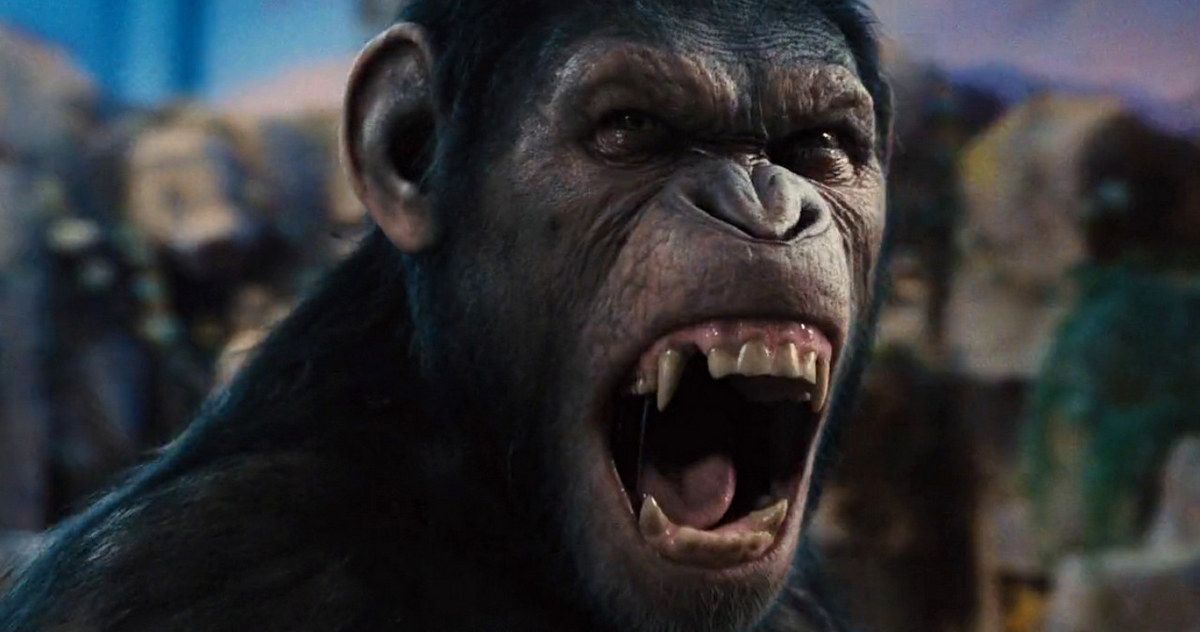One of this summer's most highly-anticipated movies is the 20th Century Fox sequel Dawn of the Planet of the Apes, set several years after 2011's Rise of the Planet of the Apes. Andy Serkis revealed in a recent interview that his character Caesar has lead his army of apes to educate themselves and build a life for themselves in the wilderness, while teasing that the humans lead by Jason Clarke, Gary Oldman and Keri Russell are not the villains.
"You could go so wrong with a Planet of the Apes reboot; you could make it melodramatic, you could make it campy, you could fall into so many traps with it. But what we all wanted to do, and what (writer-director) Matt (Reeves) loved about writing Planet of the Apes, was its honesty, and the emotional center of it. It is a film that is about family as well as empathy and prejudices, and those are things that surround us on a daily basis.
To be able to play characters which are apes that are anthropomorphic to the point where we can really see the human condition, and all of its difficulties and complications... It sets up a world where you're finally in a beautiful, utopian Garden of Eden really, that is suddenly shattered in a violent and dramatic way.
Caesar ten years on since yesterday, he's galvanized all these tribes of apes, and it's succeeding, it's working. The next generation is becoming educated; the design of their community reflects their intelligence. They are resourceful, they can build aqueducts, they have plentiful food supplies, they respect each other as different species: Gorilla, Orangutan, Chimpanzee can all speak equally and communicate equally. Until the arrival of human beings, who, by the way, are not the villains of the film! They are also a species who are very much suffering from being almost completely wiped out.
So we're encouraged to see really both sides, the human and the ape, of the story. It's not over celebrating a peaceful ape community at all but realizing that both sides have complexities and necessities and things that drive them, and what they're prepared to do to save their own tribe."
Andy Serkis also revealed that Caesar now has a teenage son named River, a relationship which the actor based on his relationship with his own son.
"You're always drawing on aspects of your own person. For instance, the journey of Caesar and his teenage son, River, for me is very much based on my relationship with my teenage son. You have to access those emotions- that's current and relevant to me right now, it's tangible and that's what breathes life and truth into a character and a performance. There are also points in this film where I've had to build myself up to a point of rage that is out of control and very aggressive; and you have to go there; you can't hide behind anything when you're playing these kind of roles."
The actor also said that Caesar's facial expressions are his own, portrayed through motion capture, and that his children could recognize their father as Caesar through his expressions alone.
"The facial expressions are directed. My children were actually watching last night, and they recognize Caesar totally as me... and did with Kong and with Gollum, sadly. Because the technology, the fidelity to replicate the nuanced performance choices of the actor is so close now! When you see the side-by-sides, it's fantastic."
He also spoke about how Dawn of the Planet of the Apes touches on social issues that resonate with audiences today.
"I think these films were always about civil rights, and I think that metaphor carries through and resonates with audiences worldwide. Why do you think the Apes franchise has endured so long? Because anthropomorphizing is something that we do, even with our pets, and we do that because we have grown further away from animals and are encouraged to see ourselves as an elevated species; when in fact we could learn quite a bit more from animals. And we learn so much more from apes, because they are so close to us genetically.
I don't think there's one specific metaphor; when Rise of the Planet of the Apes came out, the Arab spring was happening, there were riots in London, there was an attitude of real unrest and people wanting change, and being oppressed, and standing up and saying, 'I've had enough,' and not knowing what's going to happen next. And we're still in the throes of that worldwide. The beginning of this movie is setting up a society, which may or may not work but seems to be working, until something else happens that conflicts with that.
This is a very balanced film, it's not siding with the ape story, and the human story is just as important; it's not saying one is more important than the other. And it truly is about prejudice and empathy. There are certain characters from the human side and certain characters from the ape side who want to make things work, who want to engage, who want to find peaceful solutions- and there are characters who don't, and that's the world we live in."
CLICK HERE to read the full interview with Andy Serkis for Dawn of the Planet of the Apes, in theaters July 18.

